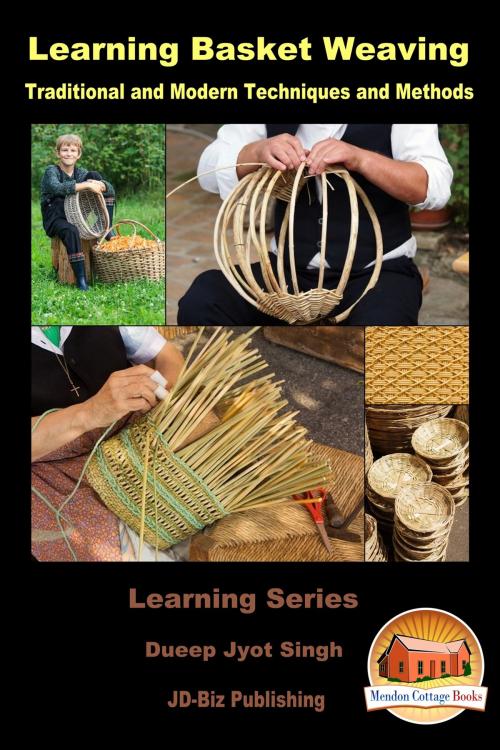Learning Basket Weaving: Traditional and Modern Techniques and Methods
Nonfiction, Home & Garden, Crafts & Hobbies| Author: | Dueep Jyot Singh | ISBN: | 9781310227639 |
| Publisher: | Mendon Cottage Books | Publication: | March 17, 2016 |
| Imprint: | Smashwords Edition | Language: | English |
| Author: | Dueep Jyot Singh |
| ISBN: | 9781310227639 |
| Publisher: | Mendon Cottage Books |
| Publication: | March 17, 2016 |
| Imprint: | Smashwords Edition |
| Language: | English |
Table of Contents
Introduction
Materials for Making the Baskets
Cane Base
Traditional Patterns
Stakes
By stakes
Weavers
Foot border
Waling
Upsetting
Simple Randing
Pairing
Joining Weavers
Trimming the Ends
Maintaining the Finished Articles
Some Traditional Patterns And Projects
Making a Base
Materials You Will Need
Examples – Cross design
Popular Traditional Latticework Design
Cane Fruit Basket
Plaiting
Handles
Chair Seat
Conclusion
Willow Basket
Fish trap
Smaller baskets
Author Bio
Publisher
Introduction
Traditional cane basket weaving
Basket work, basket weaving, or making containers out of cane is possibly one of the earliest crafts known to man. Archaeologists have found traces in digs, more than 7,000 years old in the Middle East, and anywhere where ancient civilizations settled.
These vestiges of baskets showed that these people used baskets as the molds for clay cooking pots. That was because the imprint of the basket weave showed clearly on the clay. Plaited basket work has also been found in the Nile Delta some of which date back as early as 8000 BC.
Many museums all over the world have a priceless collection of engine basket work usually shown along with ancient and early poetry and the common factor seems to be that baskets have always been made of any material available that is pliable, native, and the design and the type is going to be largely dependent on the availability of the material.
The moment anybody talks about a basket you subconsciously associated with bringing home the shopping as these are nearly always used for carrying or holding things. In fact, I would not be surprised if you have one or 2 of these woven examples in your own house in the shape of lobster pots, especially if you are a looking fisherman, potato baskets to hold vegetables, especially if you are a farmer, decorative baskets for crediting a wine bottle, containers to hold flowers and fruit, containers for your table to hold bread rolls, wicker baskets, waste paper baskets, work baskets, lampshades, baby cribs, pet baskets, picnic campers, and houseplant holders… The uses of such baskets are global and infinite bound only by your creativity and imagination!
This book is going to tell you all about how you can introduce yourself to this new satisfying craft, and start basket weaving when you have some leisurely time and energy over the weekend. You are definitely not going to be disappointed at the really attractive and soul satisfying final product and who knows, this may be a start of a beautiful new business!
Table of Contents
Introduction
Materials for Making the Baskets
Cane Base
Traditional Patterns
Stakes
By stakes
Weavers
Foot border
Waling
Upsetting
Simple Randing
Pairing
Joining Weavers
Trimming the Ends
Maintaining the Finished Articles
Some Traditional Patterns And Projects
Making a Base
Materials You Will Need
Examples – Cross design
Popular Traditional Latticework Design
Cane Fruit Basket
Plaiting
Handles
Chair Seat
Conclusion
Willow Basket
Fish trap
Smaller baskets
Author Bio
Publisher
Introduction
Traditional cane basket weaving
Basket work, basket weaving, or making containers out of cane is possibly one of the earliest crafts known to man. Archaeologists have found traces in digs, more than 7,000 years old in the Middle East, and anywhere where ancient civilizations settled.
These vestiges of baskets showed that these people used baskets as the molds for clay cooking pots. That was because the imprint of the basket weave showed clearly on the clay. Plaited basket work has also been found in the Nile Delta some of which date back as early as 8000 BC.
Many museums all over the world have a priceless collection of engine basket work usually shown along with ancient and early poetry and the common factor seems to be that baskets have always been made of any material available that is pliable, native, and the design and the type is going to be largely dependent on the availability of the material.
The moment anybody talks about a basket you subconsciously associated with bringing home the shopping as these are nearly always used for carrying or holding things. In fact, I would not be surprised if you have one or 2 of these woven examples in your own house in the shape of lobster pots, especially if you are a looking fisherman, potato baskets to hold vegetables, especially if you are a farmer, decorative baskets for crediting a wine bottle, containers to hold flowers and fruit, containers for your table to hold bread rolls, wicker baskets, waste paper baskets, work baskets, lampshades, baby cribs, pet baskets, picnic campers, and houseplant holders… The uses of such baskets are global and infinite bound only by your creativity and imagination!
This book is going to tell you all about how you can introduce yourself to this new satisfying craft, and start basket weaving when you have some leisurely time and energy over the weekend. You are definitely not going to be disappointed at the really attractive and soul satisfying final product and who knows, this may be a start of a beautiful new business!















